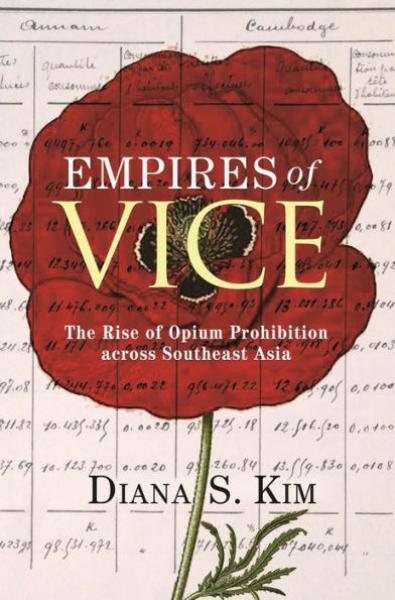Description
A history of opium's dramatic fall from favor in colonial Southeast Asia
During the late nineteenth century, opium was integral to European colonial rule in Southeast Asia. The taxation of opium was a major source of revenue for British and French colonizers, who also derived moral authority from imposing a tax on a peculiar vice of their non-European subjects. Yet between the 1890s and the 1940s, colonial states began to ban opium, upsetting the very foundations of overseas rule--how did this happen? Empires of Vice traces the history of this dramatic reversal, revealing the colonial legacies that set the stage for the region's drug problems today.
Diana Kim challenges the conventional wisdom about opium prohibition--that it came about because doctors awoke to the dangers of drug addiction or that it was a response to moral crusaders--uncovering a more complex story deep within the colonial bureaucracy. Drawing on a wealth of archival evidence across Southeast Asia and Europe, she shows how prohibition was made possible by the pivotal contributions of seemingly weak bureaucratic officials. Comparing British and French experiences across today's Burma, Cambodia, Laos, Malaysia, Singapore, and Vietnam, Kim examines how the everyday work of local administrators delegitimized the taxing of opium, which in turn made major anti-opium reforms possible.
Empires of Vice reveals the inner life of colonial bureaucracy, illuminating how European rulers reconfigured their opium-entangled foundations of governance and shaped Southeast Asia's political economy of illicit drugs and the punitive state.
"Though today opiates are highly controlled substances and generally viewed as menaces to society, the opium trade was once licit and profitable, both for merchants and for the governments to which they paid taxes. During the late nineteenth century, British and French colonies in Southeast Asia drew up to fifty percent of their revenue from taxes on opium consumption. Given its profitability and European rulers' strenuous defence of opium as an integral part of managing an empire, how did both attitudes toward and laws about opium shift so dramatically by the mid-twentieth century? This book argues against the conventional understanding that opium prohibition was enacted as part of a wave of liberal humanitarianism or because doctors awoke to its dangers to users' wellbeing, and instead offers a more complex story. In examining the opium's fall from grace throughout British and French colonies in Southeast Asia from the 1860s to the 1940s, Diana Kim combines extensive archival research with her training in political science. This book reveals the key role minor colonial administrators played in the abolition process. Local administrators were players in intellectual debates and decision-making processes concerning opium, and the knowledge they produced-their records and observations-influenced the empire's revenue policies. The author's analysis of these processes challenges notions that states implement policies based on maximizing their revenue. By observing how opium prohibition was implemented differently and at different times across the region, Kim argues against the idea that the push for prohibition came from the metropole. Further, she reflects on the lasting legacies of prohibition and the implications for present-day politics and public regulation of vice crimes and illicit markets, making a statement about how vice is defined and how its regulation affects processes of state formation, colonial and otherwise"--
Product Details
- Princeton University Pres Brand
- Feb 18, 2020 Pub Date:
- 0691172404 ISBN-10:
- 9780691172408 ISBN-13:
- 336 Pages
- 9.3 in * 6.2 in * 1.1 in Dimensions:
- 1 lb Weight:




